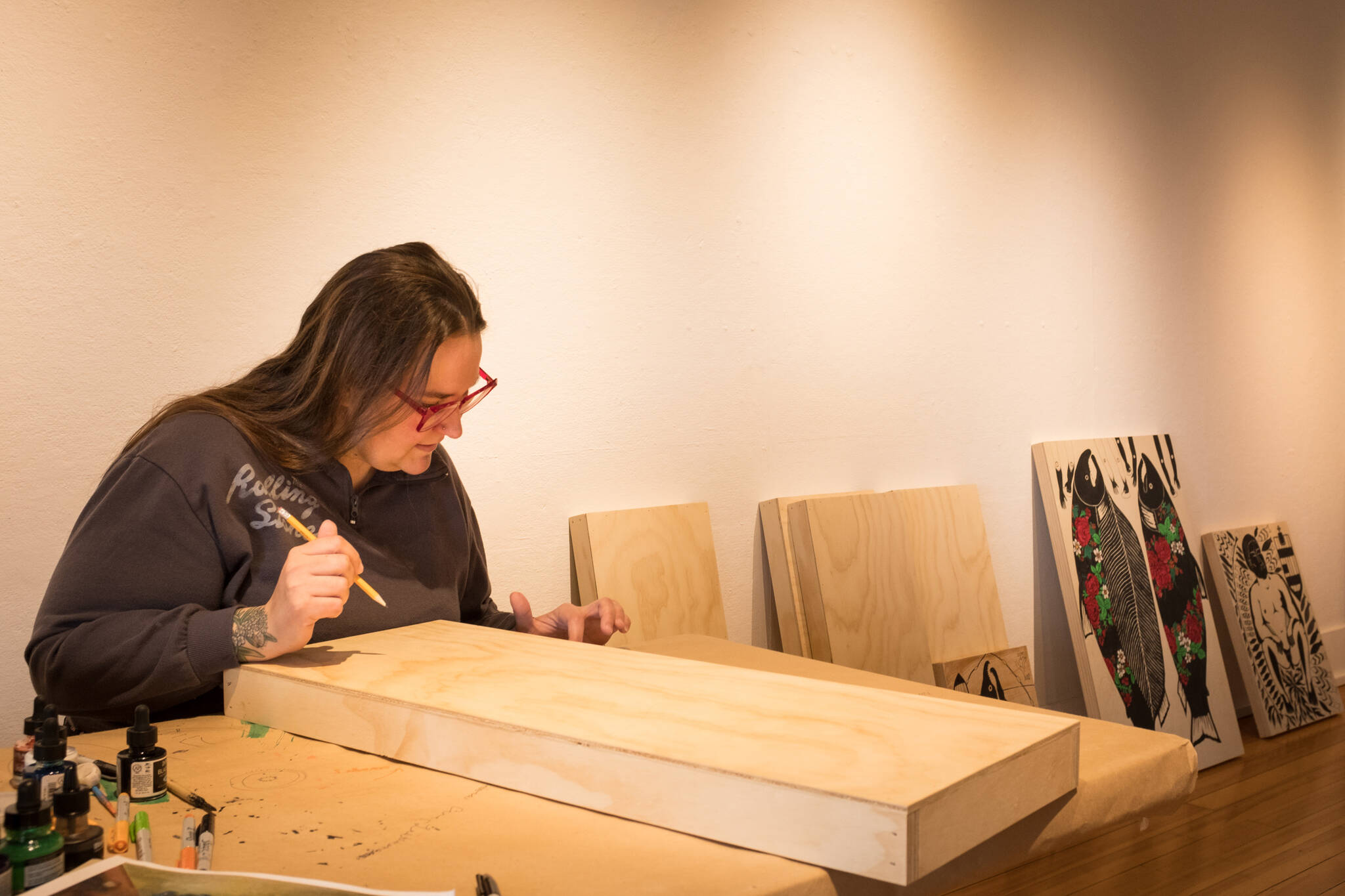For artist Amber Webb, sometimes there are no words to process the tangle of trauma and resilience life requires. She turns to art to explore the blurred boundaries between sorrow and celebration, hardship and healing.
Webb is in Homer for two weeks as an artist in residence at Bunnell Street Arts Center, where her work will be on display throughout the month following her First Friday artist talk on May 6. Webb’s work is often imbued with imagery from traditional Yup’ik storytelling; during her time at Bunnell, Webb said she was continuing to work on a series of ink drawings and experimenting with traditional carving techniques to honor Indigenous women’s sovereignty.
“Most of my work has to do with continuing and passing down and understanding cultural knowledge and cultural practices,” Webb said.
The traditional stories and imagery she incorporates in her artwork are rooted in Webb’s journey to better understand her own background. Bristol Bay’s history is one of mixing, Webb said. The Yup’ik name Curyung, describes a point of land later named Dillingham, as “the place where the waters mixed,” she said.
“But I think that place is also where a lot of bloodlines have mixed, and where cultures have mixed,” she said. “I think there’s a lot of layers to that.”
One of the ways that Webb navigates the region’s blend of ancestral stories — and a history shaped by both industry and a subsistence way of life — is through incorporating maps. Webb said maps can help contextualize visual storytelling, and also subtly push back on a misconception that maps of the region came from colonialism.
“We’ve always had maps,” Webb said. Reclaiming that heritage is an important theme in her work, she said, and “really ties in with this movement to acknowledge Indigenous places, names and Indigenous history.”
She added, “We have a lot of history that goes back thousands and thousands of years, and we have stories that reflect that.”
For Webb, engaging with these stories is an active process.
“I don’t think that I could create the work that I create without actively practicing subsistence,” she said. “That means being out on the land, being part of the land.”
It also means acknowledging that humans are just one part of the ecosystem, Webb said. Her work often explores the question: “What does it mean to honor the spirit of another being?”
That curiosity has helped Webb develop a deeper appreciation of her ancestors’ incredible resilience, she said. Instead of thinking of their culture as something that used to exist, Webb said she thinks of it “more and more as something that has continued, and will continue.”
There have been breaks in traditional knowledge because of colonial trauma, Webb said, but “everything that my ancestors interacted with, that’s still all there for me.”
Webb said that concepts like intergenerational trauma and epigenetics weren’t talked about when she was younger, “but I knew what they were because I experienced them.”
She said that some of her relatives were punished for speaking their Indigenous languages.
“I’m the descendant of one of those children, you know, whose parent was hurt so badly that they didn’t pass on their knowledge,” she said.
In some of her other works, Webb said she has “tried to make sense of why I know so many women that have disappeared or been murdered or experienced domestic violence.” Webb said that because that has been her experience of the world, “I don’t think that there’s any way that I could not speak about those issues.”
For example, in the early days of the COVID-19 pandemic, when people were being told to shelter in place, Webb said, “I knew a lot of people that weren’t really safe staying home.” She created a drawing that she envisioned as an embrace from ancestors, offering protection — a hopeful response to a “visceral understanding that [staying home] was going to make people’s lives so much harder.”
But even as she addresses the impacts of trauma in her own life and community, Webb’s art celebrates resilience and strength. “I have all these examples in my life, just these incredibly strong and resourceful and intuitive and really powerful women that are holding up the world.”
Even when there are painful experiences in the background, Webb said she wanted to capture a feeling of joy, like the loud laughter in a room full of women sharing food and stories. She added, “Joy just in existing as an Indigenious woman is a powerful thing.”
She has been developing a series focusing on figures of larger-bodied women that show “in spite of all these really challenging things that have happened to my people, here we still are.”
She added, “We take up space, and we’re allowed to take space, and we’re allowed to be here.” She said even in her own family, taking ownership like this can feel revolutionary. “I just hope that everyone feels seen, like they’re allowed to exist in the world, and that they deserve respect.”
Webb said that it’s essential that her work is deeply honest, and even when that is painful, she finds ways to illustrate the accompanying strength and pride — often with a dash of humor. She said this echoes the traditional stories she grew up with.
“There’s always just like an edge, and a darkness to things,” she said. “It’s a tough land. It’s not an easy place to exist. You have to have kind of a tough nature to live here.”


